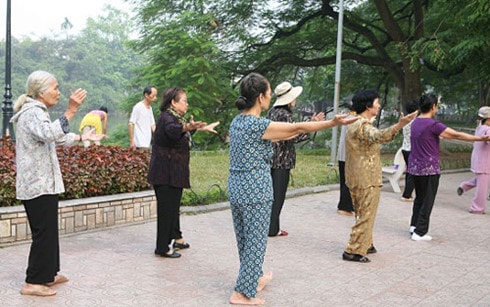10 health recommendations for the elderly
If you are older, to have the best health, you need to eat better, exercise regularly, monitor your weight, get regular health checkups and quit smoking. The American Geriatrics Society offers 10 healthy recommendations for seniors to help make their healthy living goals a reality.
 |
| Safe and healthy physical activity for the elderly. Photo: Tran Minh |
1. Eat fruits, vegetables, whole grains, fish, low-fat dairy, and healthy fats
Older adults still need healthy, low-calorie foods. Eat at least five portions of fruit and vegetables every day. Choose a variety of dark green, bright yellow, and orange varieties, such as spinach, collard greens, carrots, oranges, and cantaloupe. And include nuts and beans in your daily diet. Choose high-fiber foods, such as whole grains, brown rice, and pasta. Choose leaner meats, such as chicken or turkey. Fatty fish, such as salmon, mackerel, herring, sardines, and tuna, contain the most omega-3 fatty acids and are therefore the most beneficial.
For older adults, eating at least two servings of fish rich in omega-3 fatty acids per week is recommended. A serving of fish is 99g. Include sources of calcium and vitamin D to help keep bones strong. Two servings of milk, yogurt, and cheese daily are a good way to get these nutrients. Use healthy fats, such as olive oil and canola oil, instead of butter or lard. Use herbs and spices to add flavor when cooking, reducing the need for added salt or fat.
2. Supplement essential vitamins
Consult your doctor about any nutritional problems, it may be necessary to supplement non-prescription vitamins. In particular, pay attention to supplementing B vitamins, vitamin A. In particular, pay attention to the elderly need to supplement enough vitamin C and D, because deficiency of these two vitamins can easily develop the risk of cardiovascular disease. The dose of vitamin C is 75mg for women and 90mg for men per day. Foods rich in vitamin C include oranges, strawberries, watermelon, broccoli, Brussels sprouts, tomatoes, cauliflower and cabbage.
Recommendations suggest that, to maintain healthy levels, most adults need an average of 1,000–2,000 international units (IU) of vitamin D per day. Sunlight is the most powerful natural source of vitamin D. Just 10 minutes of exposure to summer sunlight can provide 3,000–5,000IU of vitamin D.
3. Increase physical activity
Physical activity can still be safe and healthy for older adults—even if they have heart disease, diabetes, or arthritis. In fact, many people with these conditions do better with mild to moderate physical activity. Exercises such as aerobics and walking can also help control weight, build strong muscles and bones, and improve balance, posture, and mood.
4. Regular health check-ups
Schedule at least one annual physical exam to discuss your health and any changes from the past. Screenings may include vision, hearing, and other abnormalities such as breast cancer, colon cancer, or osteoporosis. At each exam, talk to your doctor about all medications you are taking and whether you still need them. Find out if you need any necessary vaccinations.
5. Limit alcohol
Drinking too much can make you feel depressed, increase your risk of falling, cause sleep problems, interact with medications you are taking, and can contribute to other health problems. One drink is 354ml of beer (about 1 can of beer), or 148ml of wine, or 45ml of spirits. The recommended upper limit for older men is 14 drinks per week and for older women is 7 drinks per week.
6. Fall protection
One in three older adults falls each year—and falls are a leading cause of injury and death in older adults. Exercises like walking or using resistance equipment can increase muscle strength, balance, and flexibility and help prevent falls. Ask your doctor to check if your medications have side effects that can increase your risk of falling. Remove tripping hazards from your home, like slippery rugs. Install grab bars in the bathtub or toilet, and install night lights for easy access.
7. Give your brain a workout of its own
The more you use your mind, the better it works: read a book, do a crossword puzzle... Try Sudoku. Join a bridge club or discussion group at your local library or senior center. Or take a course at your local community college - free classes for seniors.
8. Quit smoking
Smoking doubles the risk of developing heart disease compared to non-smokers? It's never too late to quit. Older adults can still reduce their risk of many health problems, breathe easier, have more energy, and sleep better if they quit. Also, ask your doctor for help. Don't lose hope if you haven't been able to quit in the past. On average, smokers try to quit about four times before they succeed.
9. Speak up when you feel exhausted or anxious.
About 1 in 5 older adults experience depression or anxiety. Some possible signs of long-term depression include sadness, fatigue, loss of appetite, or decreased pleasure in daily activities. There may be difficulty sleeping, anxiety, irritability, and a desire to be alone. If any of these signs persist for more than 2 weeks, talk to your doctor and reach out to friends and family for support.
10. Get enough sleep
Older adults also need at least 7-8 hours of sleep a night. Avoiding daytime naps may help you sleep better at night. A regular sleep schedule will help synchronize your sleep/wake cycle. Go to bed at the same time every night and wake up at the same time every morning. Make your bedroom a private space. Allow for intimacy and quiet activities like meditation and reading. Keep your room cool, dark, and quiet. Your mattress should be comfortable.
To have good health, the elderly should follow the recommendations above, to help have a quality and long life as desired./.
According to VOV
| RELATED NEWS |
|---|


